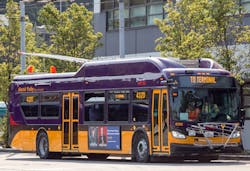King County Launches Next Generation of Electric Trolleys
For the first time in nearly three decades, King County Metro riders will enjoy completely new state-of-the-art electric trolleys in downtown Seattle and nearby neighborhoods starting Aug. 19. King County Executive Dow Constantine also previewed a prototype battery-powered bus that could become the next era of transit technology.
The new trolleys will use up to 30 percent less electricity than the current fleet and will significantly reduce operating costs.
Bus riders are about to see a fifth color — purple — added to the fleet of electric trolleys that serve the city of Seattle, as King County Metro Transit introduces the first completely new state-of-the-art electric trolleys in nearly 30 years.
"Electric trolleys are ideal for moving people in dense urban environments, making up 12 percent of our fleet but carrying 20 percent of our weekday riders," said King County Executive Dow Constantine. "And they emit zero emissions. By running trolleys instead of diesel-hybrid buses over the next five years, we are keeping 42,000 metric tons of greenhouse-gas emissions out of our air."
"I've been pleased to fight hard to keep our all-electric trolley fleet in operation and on the streets of Seattle," said King County Council Chair Larry Phillips. "These new all-electric buses are perfect for neighbors, keeping our neighborhoods quiet, and a win for transit riders, the environment, and the financial bottom line."
The first five of 174 replacement trolley buses go into service Aug. 19, with the remaining trolleys phased in over the next two years. Deployment of the new trolleys, along with the arrival within a few months of three new prototype battery buses, continues to position Metro as an industry leader in expanding the use of green technology in public transportation. The new trolleys will use up to 30 percent less electricity than the current fleet and will significantly reduce operating costs.
New state-of-the-art trolley fleet saves energy and money
Among the benefits riders will enjoy on the new trolleys manufactured by New Flyer will be the addition of passenger-activated back doors for easier exiting, and the ability of buses to go off-wire for short distances to detour around construction zones and other obstacles and stay on schedule. The buses will also have air conditioning and low floors for easy boarding.
Metro, which operates the second-largest trolley fleet in the nation, will initially deploy 110 40-foot vehicles, with the first 60-foot coaches arriving in early 2016. The City of Seattle is purchasing 14 new trolleys with funds recently approved by voters.
"Since June — in just the first two months of expanded service in Seattle — we've seen an increase of 5,000 daily transit trips," said Seattle Mayor Ed Murray. "We are ushering in a new era of bus transit in Seattle and new service means new buses. Electric trolleys are still the best zero-emissions technology available, even after 75 years."
Cost of the new trolley fleet is an estimated $186 million, with about 65 percent paid by federal grants. The electric trolley system will cost less to operate than Metro's hybrid fleet, once fuel consumption, maintenance, and grant funding are factored in.
Metro has been extending the life of older buses through refurbishment, but those coaches become outdated and unreliable as their electrical systems and motors wear out. A 2009 County performance audit confirmed that, when compared to their diesel-hybrid counterparts, electric trolley buses are quieter, use less energy, perform better on hills, and are more cost-effective to operate.
New battery-operated prototype buses look beyond the wire
Metro will test prototype electric battery buses to see if they can be used in the fleet of the future.
Beyond the new trolleys, Metro is pursuing more innovation, thanks to a $4.7 million federal grant. Over the next four to six months, Metro will take delivery of three 40-foot prototype heavy-duty battery-electric buses with fast-charging batteries, manufactured with a composite body by Proterra Inc.
The new 38-seat buses can travel up to 23 miles between charges, and remain on the road up to 24 hours a day. Batteries take 10 minutes or less to charge. The prototype bus is expected to get 15 miles more from an equivalent unit of energy than a diesel-hybrid coach. A battery-charging station has already been set up at the Eastgate Park-and-Ride lot.
Metro will test the performance and efficiency of the new technology for up to a year on local streets and roads, to determine whether battery-electric buses can be a future replacement option for Metro. The three prototypes will likely be tested on short routes serving the Eastside and downtown Seattle.





